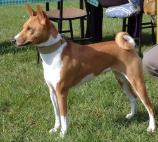
This is a placeholder text
Group text
by hunger4justice on 30 January 2012 - 15:01
Ran accross this while doing research on breast cancer FREE to pet owners:
http://research.vet.upenn.edu/ClinicalStudies/CurrentClinicalStudies/tabid/4518/articleType/ArticleView/articleId/26/Recombinant-L-monocytogenes-Vaccine-for-Dogs-with-Bone-Cancer.aspx
New Bone Cancer Vaccine
The Veterinary Clinical Investigations Center is conducting a pilot phase I dose escalation study to determine the dose of a L. monocytogenes expressing huHer-2/neu recombinant vaccine that can effectively stimulate tumor-specific immunity and prolong survival in dogs with osteosarcoma. Only those dogs with a confirmed diagnosis of osteosarcoma (by biopsy) and who have undergone limb amputation and standard chemotherapy (4 doses of carboplatin) for the treatment of osteosarcoma will be eligible for inclusion in the study. In addition, only those patients whose tumors express the target Her-2/neu will be eligible for inclusion in this study. At enrollment (3 weeks following the last dose of carboplatin chemotherapy), all eligible dogs will receive basic clinical laboratory tests including a complete blood count, chemistry screen and urinalysis and a baseline evaluation of cardiac function by echocardiography and measurement of cardiac-specific Troponin I (cTnI) levels. Chest x-rays will be taken to determine whether cancer has spread to the lungs (metastases). Only dogs with no evidence metastases will be eligible for inclusion in the study. At the time of enrollment, a blood sample will be taken to assess immune function and baseline levels of anti-tumor immunity. All dogs will be vaccinated using a L. monocytogenes expressing huHer-2/neu recombinant vaccine, there is no placebo group. The first vaccine will be given three weeks after the last dose of routine carboplatin chemotherapy. Patients will receive a total of 3 vaccines given three weeks apart. Patients will stay in the hospital for 48 hours following vaccine administration for observation. Benefits:
http://research.vet.upenn.edu/ClinicalStudies/CurrentClinicalStudies/tabid/4518/articleType/ArticleView/articleId/26/Recombinant-L-monocytogenes-Vaccine-for-Dogs-with-Bone-Cancer.aspx
New Bone Cancer Vaccine
Evaluation of a recombinant Listeria monocytogenes vector expressing huHer-2/neu to stimulate anti-tumor immunity and prolong survival times in dogs with appendicular osteosarcoma
Osteosarcoma (bone cancer) is most commonly seen in large and giant breed dogs. It is an aggressive cancer with a guarded prognosis, even when treated with amputation and chemotherapy. The purpose of this study is to determine whether a recombinant L. moncytogenes vaccine can make the dog’s own immune system attack the tumor and prolong survival in dogs with appendicular osteosarcoma.The Veterinary Clinical Investigations Center is conducting a pilot phase I dose escalation study to determine the dose of a L. monocytogenes expressing huHer-2/neu recombinant vaccine that can effectively stimulate tumor-specific immunity and prolong survival in dogs with osteosarcoma. Only those dogs with a confirmed diagnosis of osteosarcoma (by biopsy) and who have undergone limb amputation and standard chemotherapy (4 doses of carboplatin) for the treatment of osteosarcoma will be eligible for inclusion in the study. In addition, only those patients whose tumors express the target Her-2/neu will be eligible for inclusion in this study. At enrollment (3 weeks following the last dose of carboplatin chemotherapy), all eligible dogs will receive basic clinical laboratory tests including a complete blood count, chemistry screen and urinalysis and a baseline evaluation of cardiac function by echocardiography and measurement of cardiac-specific Troponin I (cTnI) levels. Chest x-rays will be taken to determine whether cancer has spread to the lungs (metastases). Only dogs with no evidence metastases will be eligible for inclusion in the study. At the time of enrollment, a blood sample will be taken to assess immune function and baseline levels of anti-tumor immunity. All dogs will be vaccinated using a L. monocytogenes expressing huHer-2/neu recombinant vaccine, there is no placebo group. The first vaccine will be given three weeks after the last dose of routine carboplatin chemotherapy. Patients will receive a total of 3 vaccines given three weeks apart. Patients will stay in the hospital for 48 hours following vaccine administration for observation. Benefits:
- Complete staging of disease at the time of enrollment (blood work, urinalysis, immune function assessment, chest x-rays, cardiac evaluation)
- Three Listeria monocytogenes vaccines
- Hospitalization for observation
- Blood work, urinalysis and cardiac evaluation every three weeks for a total of 9 weeks
- Routine staging every 2 months following last vaccine administration (blood work, urinalysis, immune assessment, chest x-rays, cardiac evaluation)
- Four doses of carboplatin chemotherapy for dog's whose tumor expresses Her-2/neu (diagnosed after limb amputation)
Contact information Disclaimer Privacy Statement Copyright Information Terms of Service Cookie policy ↑ Back to top




